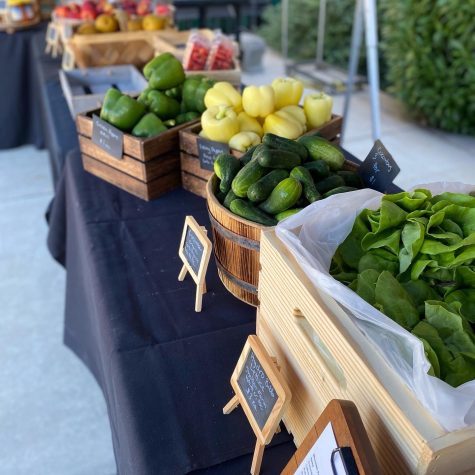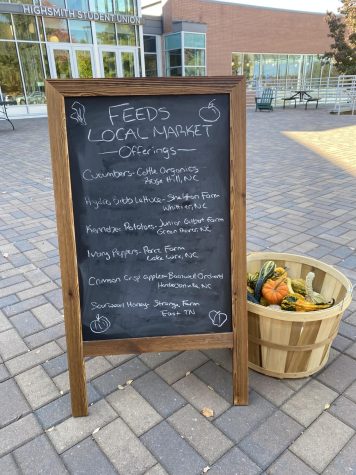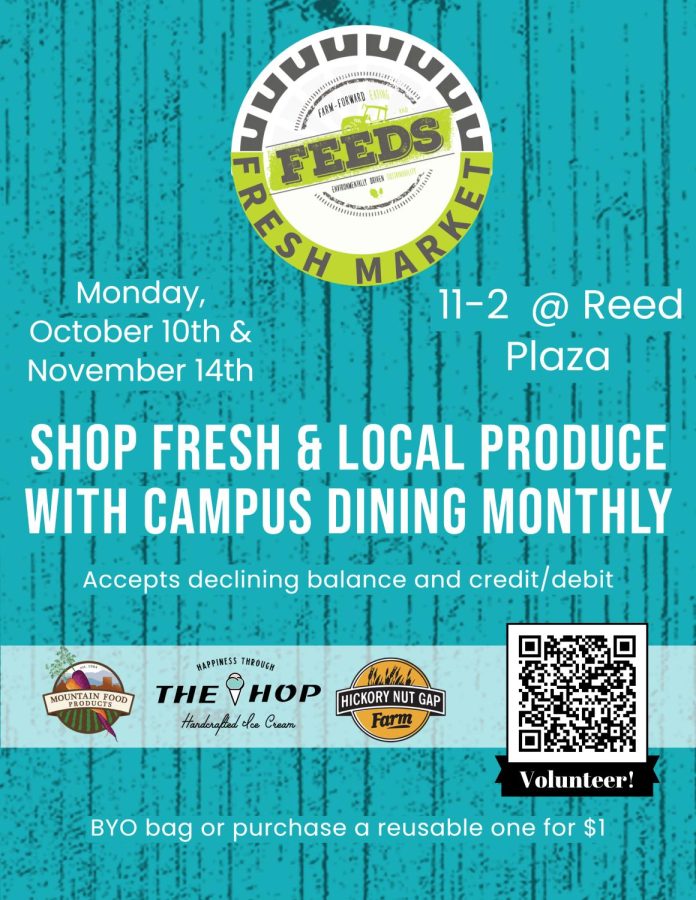Combating food scarcity for college students
Image provided by Chantal Fortin
Flyer provided by Chantal Fortin regarding the monthly fresh produce market.
November 11, 2022
Small things like making meals and buying groceries become less prioritized for busy students scrambling to pay bills, work long hours and finish strong before finals. Various programs on campus work toward aiding students with these needs.
“I am always looking for ways to put a smile on people’s faces and break up the monotony of daily life on campus,” said the Sustainability and Marketing Coordinator for UNC Asheville dining, Chantal Fortin.
Fortin said a big focus of theirs since joining the UNCA sustainability and marketing community back in February is the Farm Forward Eating and Environmentally Driven Sustainability program.
“This program focuses on four pillars: sustainable sourcing, waste reduction, education, outreach and community involvement. All are important for striving towards a more sustainable dining program,” the coordinator said.
Fortin said the FEEDS fresh market provides UNCA affiliates an on-campus outlet to purchase a variety of fresh produce and local items using a meal plan declining balance, credit/debit and/or Apple Pay.
“The reason it is called a fresh market instead of a farmer’s market is because we do not always have the farmers out on campus since they tend to a very busy farming schedule,” Fortin said. “Instead, we work with our local produce provider Mountain Foods right here in Asheville.”
The Feeds Market is hosted monthly at Reed Plaza, located between Highsmith Student Union and Brown Dining Hall.
“We source as much local as seasonally available to show what is in season in Western North Carolina and 250 miles from campus, which is what we consider to be local,” Fortin said.
The sustainability coordinator said the group focuses on Carolina grown and the Southeast region because it’s more sustainable to get items from Florida if possible, rather than shipping them from California or Mexico.
“This market has many facets, including inviting our local vendors to come out to campus,” Fortin said.
Fortin said their first market included Hop Ice Cream, Hickory Nut Gap and Buchi handing out samples and talking about their local businesses.
The FEEDS fresh market, according to Fortin, provides a platform to talk about sustainable foods, what’s in season and to highlight “ugly” foods that do not reach the grocery stores and often go to waste.

The coordinator said they want to take initiative to educate the campus on fresh foods and how to utilize them.
“Students can get involved by volunteering at the markets, which would entail talking with guests, helping with check out, set-up and cleaning,” Fortin said.
Fortin said the FEEDS group hopes to continue growing and evolving toward being a dining staple.
“We need support and feedback from our campus to ensure we are reaching the broadest audience,” Fortin said.
“We have also started a plastic bag recycling program this semester here on campus,” Fortin said. “So far in two and a half months, we have collected and recycled 152 pounds of plastic. Anyone is allowed to drop off their plastic bags and films to The Down Under.”
Fortin said they are working toward sending out surveys to ask people’s opinions.
“We try to have a wide variety on campus of different options to meet the needs and wants of students,” said the seven-year Director of Dining Services, Brooks Casteel.
Casteel said meal plans for on-campus dining are available for students who reside both on and off campus.
“We do our best to satisfy a wide variety of dinners, however we realize that people have individual and specific tastes,” Casteel said. “With that, we are always open to suggestions of different dishes or items to carry.”
The director said dining services operates Brown Dining Hall, Highsmith Food Court, Roasted coffee shop, Smoothie Lab, Wild Blue and The Down Under, as well as Food Truck Fridays and the monthly fresh market.
The director said one limitation to the meal plan would be wanting a specific item or cuisine that is not served on campus that particular day or having strict dietary restrictions or allergies.
“We have a registered dietitian on staff that can help any of our diners navigate the food options on campus,” Casteel said. “We are always happy to help in any way we can.”
Another on-campus initiative combating food insecurity is the Food Equity Initiative.
“Our distributions are important because we are able to provide free food to anyone who wants or needs it,” said involved Food Equity Initiative Member, Naomi Todd.
Todd said they started working for the Food Equity Initiative in the beginning of the spring 2022 semester.
“Before that I worked as a garden manager for the SEC (student environmental center) for three semesters, and worked adjacently with the FEI through providing produce from the campus gardens,” the student said.

The Food Equity Initiative is a project run by the Health and Wellness department.
“We have weekly free food distributions on the quad on Tuesdays from 12-2 pm,” Todd said. “At our distributions, we have a wide variety of non-perishable food items as well as menstrual products, condoms and occasionally produce from campus gardens.”
Todd said students who wish to be involved can donate non-perishables and spread the word about the initiative.
“In mid-November we will be working with the Key Center on their Food Justice week,” Todd said. “One event that’s part of that week I’d like to mention there will be an informational session on how to apply for SNAP(EBT) benefits as a college student.”
To find out more about the initiative Todd said the Instagram is @foodequityunca.
“I have also personally met a lot of really wonderful people through this job,” said Todd. “It’s nice to talk to people every week.”


![Brooke Pedersen [second from the right] and Luis Reyes [right] hold banners during the Wrap The Woods event.](https://thebluebanner.net/wp-content/uploads/2025/09/ELIZABETH_PRITCHITT_IMG_3470-1200x804.jpg)















